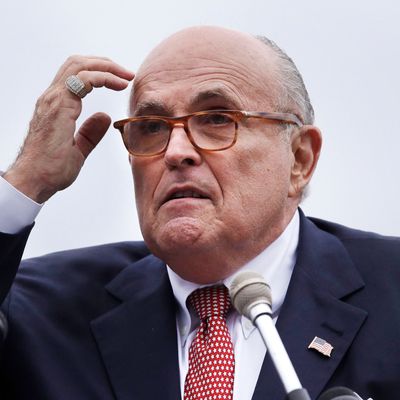
Rudy Giuliani, President Trump’s attorney-of-sorts, is either a blithering imbecile, or a subtle genius carrying out a brilliant defense strategy on his client’s behalf. The middle ground between these two alternatives is increasingly untenable. Oddly enough, even though the two theories are mutually exclusive, Giuliani’s performance over the last two days provides some basis of support for both.
In his latest startling comments, Giuliani confessed, and then frantically unconfessed, to an extremely damning set of facts for the president. In two interviews, Giuliani admitted Trump had been negotiating to build an apartment tower in Moscow during the presidential campaign. This would mean Russia was dangling a huge payout before Trump while he was running for president (and denying any financial ties to Russia), and that Russia knew his denials were false and could potentially blackmail him.
In a New York Times interview, Giuliani quoted Trump as saying the Moscow project was “going on from the day I announced to the day I won.”
Giuliani has spent most of the last two days attempting to withdraw this confession. “My recent statements about discussions during the 2016 campaign between Michael Cohen and then-candidate Donald Trump about a potential Trump Moscow ‘project’ were hypothetical and not based on conversations I had with the President,” he asserted in a prepared statement.
What does it mean that the conversations were “hypothetical”? Was it a dream? Was it some literary attempt to write an O.J. Simpson–style If I Did It book that would not constitute legally admissible evidence?
Isaac Chotiner asked Giuliani to explain. The result was weird.
Chotiner: The Times reported yesterday, “President Trump was involved in discussions to build a skyscraper in Moscow throughout the entire 2016 presidential campaign …”
Giuliani: He’s wrong! They’re wrong!
Chotiner: “… His personal lawyer said on Sunday.”
Giuliani: I didn’t say that. Go find out where I said that on Sunday. I never said he was involved in such conversations. I said the same thing I said to you, which is—
Chotiner: The quote in the story from you is that the “ ‘discussions were going on from the day I announced to the day I won,’ Mr. Giuliani quoted Mr. Trump as saying during an interview with The New York Times.”
Giuliani: I did not say that.
Chotiner: The Times just made that quote up?
Giuliani: I don’t know if they made it up. What I was talking about was, if he had those conversations, they would not be criminal.
But even if the Times had somehow doctored or fabricated this incriminating quote, it would not explain how Giuliani said the same thing in an interview with Chuck Todd on Sunday:
Giuliani: Well, it’s our understanding that it – that they went on throughout 2016. Weren’t a lot of them, but there were conversations. Can’t be sure of the exact date. But the president can remember having conversations with him about it.
Todd: Throughout 2016 –
Giuliani: The president also remembers – yeah, probably up – could be up to as far as October, November. Our answers cover until the election. So anytime during that period they could’ve talked about it.
It’s going to be tricky for Giuliani to say this quote was also made up because he said it on camera on a program that was watched by millions of people.
The case for why Giuliani is simply an idiot is fairly self-evident. (It’s worth adding that, as former prosecutor Renato Mariotti points out, by describing a conversation with Trump to the Times, Rudy gave up his ability to shield it behind attorney-client privilege.)
And yet the counterintuitive case for why this baffling sequence of interviews indicates a hidden brilliance is also strangely plausible. “It appears the Giuliani strategy includes, little by little, confirming troubling facts so that they won’t seem as jarring when revealed in full by Mueller or others,” writes Jim VandeHei of Axios, “This allows Trump and others to say: ‘This isn’t new.’ Or: ‘Trump disclosed this earlier.’”
It is certainly true, as a public relations strategy, that there is some gain in manipulating the media’s perception of what counts as “news.” Scandals that get broken by news outlets tend to attract far more attention than revelations offered up for attorneys for the president. Giuliani floated a highly incriminating admission, but before the media could absorb and amplify it, quickly led reporters into a surreal netherworld. Trump’s involvement in the Moscow project during the campaign is both a disclosed fact (old news!) and a charge Trump’s supporters can deny. And by the time reporters sort through the confusion and nail Giuliani down to one position, he’ll have dazzled everybody with a new confession.
Of course, he’s probably just an idiot. On the other hand, with a client facing as many points of legal vulnerability as Trump, is there really a better strategy?






























